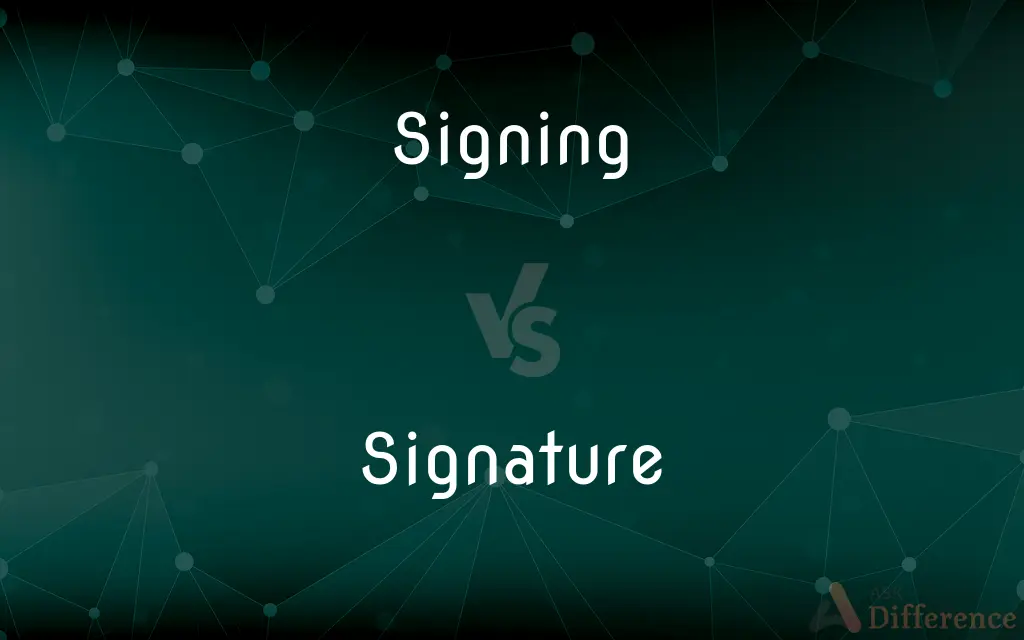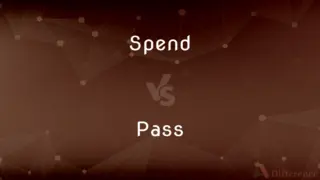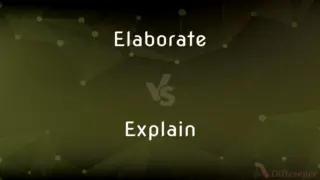Signing vs. Signature — What's the Difference?
By Maham Liaqat & Urooj Arif — Updated on April 2, 2024
Signing is the act of writing one's name or a symbol on a document, indicating agreement or acknowledgment, while a signature is the specific mark or name written.

Difference Between Signing and Signature
Table of Contents
ADVERTISEMENT
Key Differences
Signing is an action, the process of putting one's name or mark on a document, often to show consent or acknowledgement. It's a verb that describes the act of making a signature. Whereas a signature is a noun; it refers to the actual written or digital mark that an individual creates as a representation of their identity. This distinction is fundamental in understanding the dynamic between the act and its result.
The nature of signing can vary; it might involve a traditional pen-and-paper method or a digital process using electronic devices. This flexibility allows for different contexts and technologies to accommodate the act of signing. On the other hand, a signature, whether created digitally or with ink, remains a personal identifier, unique to each individual. It can be as simple as one's name in a stylized script or as complex as an encrypted digital signature in electronic documents.
Legally, signing a document implies the person's agreement to the terms within or acknowledgment of the content. It carries weight in legal contexts, signifying consent or approval. A signature, in contrast, is the tool through which this legal act is performed. It's the physical or digital expression that gives the act of signing its validity and binding nature.
In the context of authentication, signing a document or item authenticates it, serving as evidence of the signee's involvement or presence. Meanwhile, a signature can be analyzed for its authenticity, compared against other instances to confirm the identity of the signee. This aspect highlights the interplay between the act of signing and the signature itself in verifying transactions or documents.
Culturally and personally, the style and form of a signature can express individuality and identity. It's a form of personal branding, often consistent over time yet may evolve. Signing, however, is a momentary act that reflects a person's intention at a specific time, subject to the situation and purpose of the document being signed.
ADVERTISEMENT
Comparison Chart
Definition
The act of writing one's name or mark on a document.
The written or digital mark made by an individual.
Nature
Verb; an action.
Noun; the result of an action.
Context
Can be digital or physical.
Can be analyzed for authenticity.
Legal Implications
Signifies consent or acknowledgment.
Serves as a personal identifier with legal standing.
Personal Expression
Reflects intention at the time of signing.
Reflects individuality and can serve as personal branding.
Compare with Definitions
Signing
Agreeing to a policy by acknowledging it with a signature.
Signing the company policy meant agreeing to its terms.
Signature
A stylized personal identifier used across various platforms.
She uses the same signature for all her artwork.
Signing
The act of endorsing a check for payment.
Signing the back of the check authorizes the bank to process it.
Signature
A person's name written in a distinctive way.
His signature is easily recognizable by its flamboyant loops.
Signing
Authenticating a document with a signature.
Signing the diploma confirms the student's graduation.
Signature
A unique mark used for identification.
The artist’s signature at the bottom of the painting verifies its authenticity.
Signing
Authorizing a legal document by marking it.
Signing the power of attorney granted her brother legal authority.
Signature
The digital equivalent of a written name in electronic documents.
Her digital signature secured the email.
Signing
Completing a contract with a written name.
Signing the lease agreement officially secured the apartment.
Signature
A sign of approval or consent on a document.
The document needed the director's signature to be official.
Signing
Something that suggests the presence or existence of a fact, condition, or quality
A high temperature is a sign of fever.
Signature
A signature (; from Latin: signare, "to sign") is a handwritten (and often stylized) depiction of someone's name, nickname, or even a simple "X" or other mark that a person writes on documents as a proof of identity and intent. The writer of a signature is a signatory or signer.
Signing
An act or gesture used to convey an idea, a desire, information, or a command
Gave the go-ahead sign.
Signature
A person's name written in a distinctive way as a form of identification in authorizing a cheque or document or concluding a letter
The signature of a senior manager
Signing
Sign language.
Signature
Short for key signature or time signature
Signing
A displayed structure bearing lettering or symbols, used to identify or advertise a place of business
A motel with a flashing neon sign outside.
Signature
A letter or figure printed at the foot of one or more pages of each sheet of a book as a guide in binding.
Signing
A posted notice bearing a designation, direction, or command
An EXIT sign above a door.
A traffic sign.
Signature
The part of a medical prescription that gives instructions about the use of the medicine or drug prescribed.
Signing
A conventional figure or device that stands for a word, phrase, or operation; a symbol, as in mathematics or in musical notation.
Signature
One's name as written by oneself.
Signing
Pl. sign An indicator, such as a dropping or footprint, of the trail of an animal
Looking for deer sign.
Signature
The act of signing one's name.
Signing
A trace or vestige
No sign of life.
Signature
See e-signature.
Signing
A portentous incident or event; a presage
Took the eclipse as a sign from God.
Signature
A distinctive mark, characteristic, or sound indicating identity
A surprise ending is the signature of an O. Henry short story.
Signing
(Medicine) An objective finding, usually detected on physical examination, from a laboratory test, or on an x-ray, that indicates the presence of abnormality or disease.
Signature
(Medicine) The part of a physician's prescription containing directions to the patient.
Signing
One of the 12 divisions of the zodiac, each named for a constellation and represented by a symbol.
Signature
A sign used to indicate key.
Signing
To affix one's signature to
Signed the letter.
Signature
A sign used to indicate tempo.
Signing
To write (one's signature)
Signed her name to the contract.
Signature
A letter, number, or symbol placed at the bottom of the first page on each sheet of printed pages of a book as a guide to the proper sequence of the sheets in binding.
Signing
To approve or ratify (a document) by affixing a signature, seal, or other mark
Sign a bill into law.
Signature
A large sheet printed with four or a multiple of four pages that when folded becomes a section of the book.
Signing
To hire or engage by obtaining a signature on a contract
Signed a rookie pitcher for next season.
Sign up actors for a tour.
Signature
See chemical signature.
Signing
To relinquish or transfer title to by signature
Signed away all her claims to the estate.
Signature
A person's name, written by that person, used as identification or to signify approval of accompanying material, such as a legal contract.
Signing
To provide with a sign or signs
Sign a new highway.
Signature
An act of signing one's name; an act of producing a signature.
Signing
To communicate with a sign or signs
Signed his approval with a nod.
Signature
(medicine) The part of a doctor’s prescription containing directions for the patient.
Signing
To express (a word or thought, for example) in a sign language
Signed her reply to the question.
Signature
(music) Signs on the stave indicating key and tempo, composed of the key signature and the time signature.
Signing
To consecrate with the sign of the cross.
Signature
(printing) A group of four (or a multiple of four) sheets printed such that, when folded, they become a section of a book.
Signing
To make a sign or signs; signal.
Signature
(computing) A pattern used for matching the identity of a virus, the parameter types of a method, etc.
Signing
To communicate in a sign language.
Signature
(cryptography) Data attached to a message that guarantees that the message originated from its claimed source.
Signing
To write one's signature.
Signature
(figurative) A mark or sign of implication.
Signing
The act of concluding a contract, especially by an athlete or entertainer with a company.
Signature
A dish that is characteristic of a particular chef.
Signing
(by extension) A player signed by a sporting organization.
Signature
(mathematics) A tuple specifying the sign of coefficients in any diagonal form of a quadratic form.
Signing
An event (signing session) in a bookshop etc. where an author signs copies of his or her book.
Signature
A resemblance between the external character of a disease and those of some physical agent, for instance, that existing between the red skin of scarlet fever and a red cloth; supposed to indicate this agent in the treatment of the disease.
Signing
The use of sign language; skill at using a sign language.
Signature
(internet) Text (or images, etc.) appended to a user's emails, newsgroup posts, forum posts, etc. as a way of adding a personal touch or including contact details.
Your signature must not exceed three lines of text, or 600 pixels in height.
Forum signature generator
Signing
Present participle of sign
Signature
Distinctive, characteristic, indicative of identity.
Rabbit in mustard sauce is my signature dish.
The signature route of the airline is its daily flight between Buenos Aires and Madrid.
Signing
Language expressed by visible hand gestures
Signature
A sign, stamp, or mark impressed, as by a seal.
The brain, being well furnished with various traces, signatures, and images.
The natural and indelible signature of God, which human souls . . . are supposed to be stamped with.
Signature
Especially, the name of any person, written with his own hand, employed to signify that the writing which precedes accords with his wishes or intentions; a sign manual; an autograph.
Signature
An outward mark by which internal characteristics were supposed to be indicated.
Some plants bear a very evident signature of their nature and use.
Signature
A resemblance between the external characters of a disease and those of some physical agent, for instance, that existing between the red skin of scarlet fever and a red cloth; - supposed to indicate this agent in the treatment of the disease.
Signature
The designation of the key (when not C major, or its relative, A minor) by means of one or more sharps or flats at the beginning of the staff, immediately after the clef, affecting all notes of the same letter throughout the piece or movement. Each minor key has the same signature as its relative major.
Signature
A letter or figure placed at the bottom of the first page of each sheet of a book or pamphlet, as a direction to the binder in arranging and folding the sheets.
Signature
That part of a prescription which contains the directions to the patient. It is usually prefaced by S or Sig. (an abbreviation for the Latin signa, imperative of signare to sign or mark).
Signature
To mark with, or as with, a signature or signatures.
Signature
Your name written in your own handwriting
Signature
A distinguishing style;
This room needs a woman's touch
Signature
A melody used to identify a performer or a dance band or radio/tv program
Signature
The sharps or flats that follow the clef and indicate the key
Signature
A sheet with several pages printed on it; it folds to page size and is bound with other signatures to form a book
Common Curiosities
What is a signature?
A signature is the specific mark or name that an individual writes as their own identifier.
Why is signing important?
Signing is important as it indicates agreement, consent, or acknowledgment, giving legal validity to documents.
Can signing be done digitally?
Yes, signing can be performed digitally, using electronic means to create a signature.
Is a signature always in the form of a name?
A signature can be a name, symbol, or any unique mark chosen by an individual.
Can a signature change over time?
Yes, a person’s signature can evolve, but it generally retains key characteristics for identification.
What is signing?
Signing is the act of writing one's name or a symbol on a document as a form of agreement or acknowledgment.
Does signing have the same legal weight as a signature?
Signing is the act that carries legal weight, while the signature is the evidence of that act.
Can anyone’s signature be the same?
While theoretically possible, signatures are generally unique to each individual.
How can a signature be verified?
A signature can be verified through comparison with a known genuine signature or through digital encryption methods.
How does one create a signature style?
A signature style is often developed over time, reflecting personal taste, ease of writing, and desired level of security.
What role does a signature play in contracts?
A signature on a contract signifies that the parties have read, agreed to, and acknowledged the terms and conditions stated within.
What happens if a signing is forged?
Forged signings can lead to legal penalties, as they falsely represent someone’s consent or acknowledgment.
Is an electronic signature as valid as a handwritten one?
Yes, in many jurisdictions, electronic signatures are considered as valid as handwritten ones for most purposes.
Can a thumbprint be a signature?
Yes, a thumbprint can serve as a signature, especially in contexts where traditional signatures are not feasible.
What is the purpose of a digital signature?
Digital signatures secure electronic documents, verifying the signer’s identity and ensuring document integrity.
Share Your Discovery

Previous Comparison
Spend vs. Pass
Next Comparison
Elaborate vs. ExplainAuthor Spotlight
Written by
Maham LiaqatCo-written by
Urooj ArifUrooj is a skilled content writer at Ask Difference, known for her exceptional ability to simplify complex topics into engaging and informative content. With a passion for research and a flair for clear, concise writing, she consistently delivers articles that resonate with our diverse audience.














































